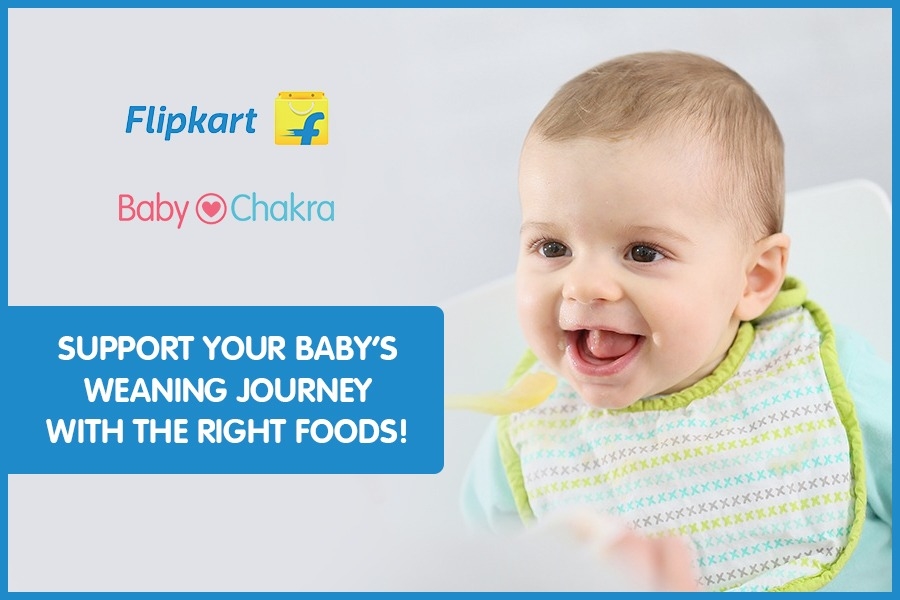
Baby Ready To Be Weaned? Here’s a guide to Introducing Solids
19 Mar 2020 | 4 min Read
Babychakra
Author | 1369 Articles
In addition to major milestones like rolling over and sprouting teeth, starting on solid food is something all parents of babies look forward to.
After 6 months of being breast fed, your baby’s tiny stomach develops to a point that it can break down nutrients from other foods as well. By the time they are between 5 to 6 months, babies tend to show some real inclination towards wanting solids and by the time your baby celebrates his/her first birthday, s/he can eat what you eat! To make his/her feeding journey fun, you can buy some great baby food products from Flipkart!
Your Baby’s First Foods
Solids at the stage of initiation can include finely mashed or pureed fruits, steamed and pureed vegetables and well-cooked, single-grain cereals. Once your baby gets used to single-fruit and vegetable purees, you can try mixing different kinds of fruits and vegetables to make smoothies and soups. Your baby’s solid meals must be supplemented with breastmilk at regular intervals.
You can also slowly introduce dal and rice khichdi, ragi or semolina kheer and porridge with natural sweeteners like jaggery and fruit puree. As your baby grows, s/he will be ready to experiment a variety of tastes. After the age of nine months, you could treat your little one’s palate with foods that have different textures, herbs and even certain spices. Eggs, fish and chicken can also be introduced at this stage.
Choose from a wide range of baby food products from Flipkart
Experimenting with More Solids
After your little one enters the toddler stage, you can introduce him/her to more complex foods and to easy-to-make multigrain cereals, especially while travelling. Cooked food tends to go bad when outdoors due to the weather conditions, packing etc. Food from restaurants might not always be safe for your child. Special baby cereals that are fortified with iron, proteins and minerals that not only taste good but are extremely nutritious and in accordance with the prescribed age-specific quantities. These can be prepared in less time and are available in a variety of multigrain and fruit combinations for kids to enjoy.
Paediatricians usually advise parents to avoid giving cow’s milk till the age of 12 months. Cow’s milk contains a high level of proteins and minerals that cannot be broken down by your baby’s gut. In fact, in some cases, animal milk manifests itself like an allergen and causes constipation, irritability or even under-nutrition in your baby.
But First, Is Your Baby Ready for Solids?
You might want to introduce your baby to a variety of tastes, but if you are just starting out on your weaning journey, find out if your little eater is ready for solids first.
Make your little eater’s weaning journey fun with products from Flipkart!
So, while the journey of introducing your baby to solid foods is nothing short of being adventurous, with time and patience you will find your rhythm and your baby will let you know exactly what they love and dislike. Though mealtimes are messy, a contented burp and the right products from Flipkart will make it well worth it!
Disclaimer: While BabyChakra strives to keep the content that it posts on website and app accurate, complete, and up-to-date, BabyChakra cannot guarantee, and is not responsible for, the accuracy, completeness, or timeliness of any Content, whether provided by BabyChakra, its Providers or Users of the Website or App. Any shares, credits or distribution of this content should be done with due credits to BabyChakra and the author/owner.
A


Related Topics for you
Suggestions offered by doctors on BabyChakra are of advisory nature i.e., for educational and informational purposes only. Content posted on, created for, or compiled by BabyChakra is not intended or designed to replace your doctor's independent judgment about any symptom, condition, or the appropriateness or risks of a procedure or treatment for a given person.


